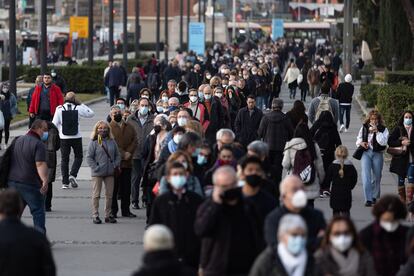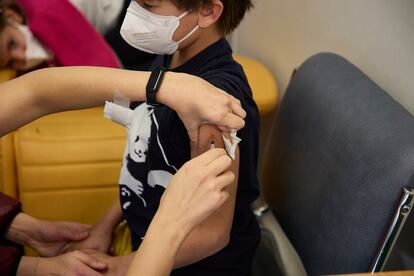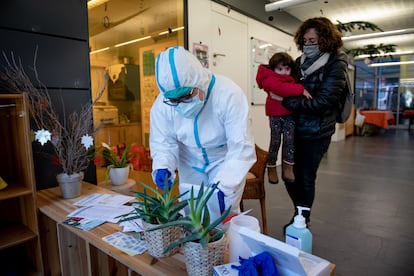Coronavirus rules in Spain: What do I do if I test positive?
With cases on the rise, EL PAÍS reviews the health recommendations on close contacts, quarantines and confirming Covid-19 infections


The vaccination campaign in Spain and the omicron variant have seen the rules of the game completely change when it comes to the coronavirus pandemic. In the former case, in a good way, and in the latter, for worse. Nearly 80% of the Spanish population is fully vaccinated against Covid-19, and this is, in theory, protecting people against serious illness and death. But it is not stopping infections, and even less so given the growing threat of omicron, which experts believe to be more transmissible and with a certain resistance to the protection offered by the vaccines. With this scenario, and with a spike in the 14-day incidence – which currently stands at 511 cases per 100,000 inhabitants in Spain – and barely any social restrictions in place, caution and individual responsibility make more sense than ever.
The healthcare authorities in Spain have been relaxing the rules in place as the vaccination campaign has progressed, and since June close contacts of a coronavirus case who are vaccinated have not had to quarantine, for example. However, the rise in infections prompted the government to make changes to protocols at the start of December, and close contacts of omicron cases must isolate for 10 days. The Catalonia region went even further on Friday, and has imposed quarantine for all close contacts once more.
Above all, the experts are calling for caution. Here are the recommendations to control the transmission of the virus.
I’m vaccinated, but I’ve tested positive for Covid-19. What should I do?
Isolate and speak to your doctor so that they can start a contact-tracing process and active monitoring of your case. Vaccination reduces the risk of serious hospitalization and death, but does not stop transmission. As such, if a positive case is vaccinated or not, they must observe a 10-day quarantine from the start of symptoms. If these persist after the 10th day, the isolation must continue for three days after they end. The Health Ministry protocols state that a negative PCR is not necessary for the end of isolation nor for the return to work.
What do I do if my child tests positive?
Your child will have to isolate because they have an active Covid-19 infection. This quarantine will last at least 10 days. In general, those living with the child – parents, siblings, etc. – can only avoid quarantine if they are also fully vaccinated, do not have compromised immune systems, and the positive case is not from the beta, gamma or omicron variants. The Health Ministry recommends, however, that these close contacts avoid seeing vulnerable people, use masks during social interactions and avoid events with large crowds.
On Friday, however, the Catalan regional government toughened up the quarantine conditions, and close contacts (including those who are vaccinated) of positive cases will have to isolate too.

What happens if my child is a close contact of a positive case at school?
If a child in a stable bubble group at school has tested positive, the rest of the group will have to quarantine for 10 days at home and cannot go to class. Just like with adults, only minors who are fully vaccinated can avoid isolation. Your child will have to take a test, but not immediately. “It’s better to do a PCR on the fourth or fifth day,” explains Salvador Peiró, an epidemiologist from the Fisabio research foundation. “There’s no point in doing them immediately because if the virus is incubating, it can come back negative.”
The people living with the close contact (parents, siblings…) are not considered contacts themselves: the contact of a contact is not a contact.
I’m a close contact of a positive case, but I’m vaccinated. Do I have to isolate?
No – not unless you live in Catalonia, where the regional government has just changed the rules making quarantine obligatory for all close contacts, you have a suppressed immune system, or the positive case of your close contact is the beta, gamma or omicron variant. This latter strain is spreading throughout Europe and is gaining ground on delta, which is currently the dominant variant.
What you must do is take at least one test – preferably PCR – during those 10 days in order to rule out the infection. “If an asymptomatic case tests positive, they have to start the quarantine from the day the PCR test was taken. If they are symptomatic and test positive, the isolation begins from the day that symptoms started.”
I think I have Covid, but I can’t get in touch with my healthcare center. What should I do?
If in doubt, isolate and wait. If you don’t have severe symptoms, such as a very high fever or difficulty breathing, you don’t need to go to your healthcare center urgently, and getting a test done is also not considered urgent in these cases. If you have symptoms, Peiró suggests doing a self-test at home. If the result is positive, the result can be trustworthy. But if it is negative, and the symptoms suggest Covid-19, it is best to get another test done. Whatever the case, the epidemiologist warns, “if you have serious respiratory symptoms, go to the emergency room.”
María Fernández, the spokesperson from the Spanish Society for Family and Community Medicine, admits that the accessibility of healthcare centers has been affected by the increased pressure caused by the pandemic. “If they don’t pick up the phone, try to get an appointment by another means, such as the web. In any case, if you have mild symptoms you don’t need to go running to your healthcare center, you can wait 24 or 48 hours.”

What happens if I test positive with a home antigen kit?
Firstly you must isolate and report the result to your regional healthcare authorities, healthcare center or Covid-19 unit in place in your region. The healthcare system will then have to confirm the result via another test, usually a PCR.
And if the home test is negative?
This doesn’t mean anything. Home testing kits are not infallible and they are not equally sensitive during the infectious process. During the first days of incubation, for example, when the viral load is lower, these tests cannot detect a positive. The board of experts advising the Health Ministry, for example, warned this summer that a negative result does not exclude the possibility of infection and should not be used under any circumstances to “shorten or end the isolation or quarantine period.”
If I do an antigen or PCR test a few days before a Christmas meal with my family and it’s negative, is this a definitive result?
This reduces risks, but does not avoid them completely. The use of masks during social interaction, social distancing and adequate ventilation are essential measures in all cases. Toni Trilla, the head of epidemiology at the Clínic Hospital in Barcelona, explains: “If you test negative, it’s quite likely you don’t have the virus, but it’s not 100% certain. You could have a low antigen load and the virus is growing, and by the time of the family meal you could have a high load and infect others.”
Tu suscripción se está usando en otro dispositivo
¿Quieres añadir otro usuario a tu suscripción?
Si continúas leyendo en este dispositivo, no se podrá leer en el otro.
FlechaTu suscripción se está usando en otro dispositivo y solo puedes acceder a EL PAÍS desde un dispositivo a la vez.
Si quieres compartir tu cuenta, cambia tu suscripción a la modalidad Premium, así podrás añadir otro usuario. Cada uno accederá con su propia cuenta de email, lo que os permitirá personalizar vuestra experiencia en EL PAÍS.
¿Tienes una suscripción de empresa? Accede aquí para contratar más cuentas.
En el caso de no saber quién está usando tu cuenta, te recomendamos cambiar tu contraseña aquí.
Si decides continuar compartiendo tu cuenta, este mensaje se mostrará en tu dispositivo y en el de la otra persona que está usando tu cuenta de forma indefinida, afectando a tu experiencia de lectura. Puedes consultar aquí los términos y condiciones de la suscripción digital.








































